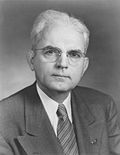| |||||||||||||||||
| |||||||||||||||||
 County results Holland: 50–60% 60–70% 70–80% 80–90% Contents
| |||||||||||||||||
| |||||||||||||||||
| Elections in Florida |
|---|
 |
The 1964 United States Senate election in Florida was held on November 3, 1964. Incumbent Democratic U.S. Senator Spessard Holland was re-elected to a fourth term in office, defeating J. Brailey Oldham in the primary and Republican Claude R. Kirk Jr. in the general election.

